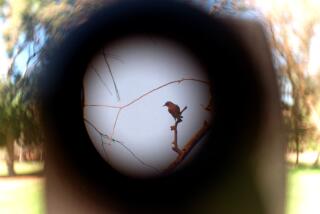Catwatching<i> by Desmond Morris (Crown: $9.95; 128 pp.) </i> : Dogwatching<i> by Desmond Morris (Crown: $9.95; 128 pp.) </i>
- Share via
As cooking incorporates elements of physics and chemistry, the antics of dogs and cats may be regarded as aspects of ethology (the science of animal behavior). It is a question of one’s point of view and frame of mind. Desmond Morris may very well be the Julia Child of behavioral science.
In his previous work, Morris, an English zoo keeper, wandered from the safety of zoology into the dangerous current of anthropology, ethology and comparative psychology. To his credit are “The Naked Ape,” “Manwatching,” “The Human Zoo” and “Bodywatching,” popularized and sometimes disputed writings of human behavior.
In “Catwatching” and “Dogwatching,” the author turns his attention to animal behavior in just the right tone for pet lovers. The question-and-answer format of these books is quite appropriate for the curator of a zoo. All that’s missing are the balloons and a bag of peanuts.
Both volumes offer a varied range of behavioral information from the silly (“Why is a female cat called a ‘Queen’?”) to the essential (“Why do dogs bark?”). Dog lovers and cat lovers will no doubt enjoy these slender works, provided that they are not already in possession of the information through their own experience or from other books.
Living with four-legged family members can be as perplexing as it is satisfying. Morris, zoologist, researcher and observer of animal life, has written a modest number of answers to questions likely on the minds of curious dog and cat owners. It is the author’s intention to satisfy the readers’ “understanding of the behavior, myths, and realities of these familiar pets.”
There are two problems with these books. First, the subject matter wanders aimlessly like a plane over the ocean running out of fuel. Because the author offers no way to apply the informati1869488244left with very little save some good material for “Trivial Pursuit.”
Second, a perennial problem with this author, is the absence of information sources. We are almost never given the opportunity to distinguish between opinion, fact or assumption drawn from the extension of known information. Thus, the readers are denied the opportunity to interact with the books and come to personal conclusions. It is like being trapped in a home slide show with no choice but to accept the armchair narration as gospel--a pity because there is much in these books that could have helped the beleaguered pet owner if only the author had taken the next logical step.
“Zut alors!”
Minou turned to come face-to-face with a sophisticated street cat who introduced herself as Celeste.
“What is all this commotion about, ma cherie! And, my word, look at you--what a sorry sight.”
From Mindy Bingham and Itoko Maeno, MINOU (Advocacy Press, POB 236, Santa Barbara 93102: $12.95; 64 pp.; full color throughout). This story of a coddled cat suddenly forced to cope with real life in the gutters of Paris is the latest “gender equity” children’s book from the publisher, last year, of “Father Gander Nursery Rhymes.” All proceeds from the sale of the book go to the Girls Club of Santa Barbara.
More to Read
Sign up for our Book Club newsletter
Get the latest news, events and more from the Los Angeles Times Book Club, and help us get L.A. reading and talking.
You may occasionally receive promotional content from the Los Angeles Times.







